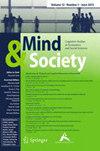health and emotional regulation among persons with hemophilia
Q1 Arts and Humanities
引用次数: 0
Abstract
The psychosocial status of people with chronic ailments has garnered undivided attention in recent years, especially for diseases such as Aids, leukemia, and hemophilia. Numerous clinical and psychological issues associated with hemophilia have been found to attribute a significant increase in emotional distress. Due to the paucity of research on the psychosocial aspects of this inherited disorder. The aim of the research was to study emotional reappraisal, emotional suppression, and health among persons with hemophilia. A total of 50 patients participated in the study and were divided into 2 age groups (19-24) and (25-30). Standardized scales such as Emotion Regulation Questionnaire (Gross & John, 2003) and Patient Health Questionnaire (Spitzer et. al, 1999) were used. The obtained results were tabulated, and correlation and independent t-tests were used to compare the means of two age groups. The total sample mean was found to be 18.10 and the standard deviation was 8.30 respectively. The correlation of health was found to be positive and significantly related to emotional reappraisal (r= 0.10) and emotional suppression (r=0.08). The result portrays there is no difference between the two age groups on emotional regulation and health. Despite much research on the genetic causes of this condition in India, there is a dire need to study the psychological challenges, social problems, and opportunities available to persons with hemophilia (PWH). Psychological and genetic counseling shall be promoted for the holistic well-being of hemophiliacs.血友病患者的健康和情绪调节
近年来,慢性病患者的社会心理状况受到了广泛关注,尤其是艾滋病、白血病和血友病等疾病。研究发现,与血友病相关的许多临床和心理问题会导致情绪困扰显著增加。由于对这种遗传性疾病的社会心理方面的研究很少。本研究旨在对血友病患者的情绪重新评估、情绪压抑和健康状况进行研究。共有 50 名血友病患者参与了这项研究,他们被分为两个年龄组(19-24 岁)和(25-30 岁)。研究使用了标准化量表,如情绪调节问卷(Gross & John,2003 年)和患者健康问卷(Spitzer et.将所得结果制成表格,并使用相关检验和独立 t 检验来比较两个年龄组的平均值。总样本平均值为 18.10,标准差为 8.30。研究发现,健康的相关性与情绪再评价(r= 0.10)和情绪压抑(r=0.08)呈显著正相关。结果表明,两个年龄组在情绪调节和健康方面没有差异。尽管印度对血友病的遗传原因进行了大量研究,但仍迫切需要研究血友病患者(PWH)面临的心理挑战、社会问题和机会。为了血友病患者的整体健康,应促进心理和遗传咨询。
本文章由计算机程序翻译,如有差异,请以英文原文为准。
求助全文
约1分钟内获得全文
求助全文
来源期刊

Mind and Society
Arts and Humanities-Philosophy
CiteScore
2.30
自引率
0.00%
发文量
5
期刊介绍:
Mind & Society is a journal for ideas, explorations, investigations and discussions on the interaction between the human mind and the societal environments. Scholars from all fields of inquiry who entertain and examine various aspects of these interactions are warmly invited to submit their work. The journal welcomes case studies, theoretical analysis and modeling, data analysis and reports (quantitative and qualitative) that can offer insight into existing frameworks or offer views and reason for the promise of new directions for the study of interaction between the mind and the society. The potential contributors are particularly encouraged to carefully consider the impact of their work on societal functions in private and public sectors, and to dedicate part of their discussion to an explicit clarification of such, existing or potential, implications.Officially cited as: Mind Soc
 求助内容:
求助内容: 应助结果提醒方式:
应助结果提醒方式:


